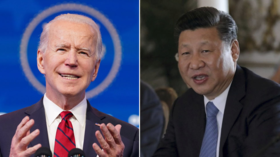Καθώς οι εντάσεις μεταξύ της Κίνας και της Ταϊβάν συνεχίζουν να αυξάνονται, τα μηνύματα του Λευκού Οίκου που προκάλεσαν την έκπληξη προκάλεσαν την Ταϊπέι να «αναβοσβήνει» πρώτα;
είναι Βρετανός συγγραφέας και αναλυτής πολιτικής και διεθνών σχέσεων με πρωταρχικό στόχο την Ανατολική Ασία.

Οι εντάσεις στο Στενό της Ταϊβάν αυξάνονται. Την περασμένη εβδομάδα, σύμφωνα με την Εθνική Ημέρα της Κίνας, το Πεκίνο έστειλε ρεκόρ στρατιωτικών αεροσκαφών σε αυτό που είναι γνωστό ως «Ζώνη Ταυτοποίησης Αεροπορικής Άμυνας» της Ταϊβάν (ADIZ). Ενώ είναι σημαντικό να γίνει διάκριση αυτής της ζώνης από τον πραγματικό «εναέριο χώρο» του νησιού, καθώς η ADIZ περιέχει επίσης την επαρχία Φουτζιάν της Κίνας, είναι αλλιώς αδύνατο να παρεξηγηθεί η πρόθεση της Κίνας. Τους τελευταίους μήνες το Πεκίνο αντιλαμβάνεται ότι το νησί έχει σπρώξει τις «κόκκινες γραμμές» του σε διάφορους τομείς, κάτι που ενθαρρύνεται από την αυξανόμενη υποστήριξη των ΗΠΑ και των συμμάχων τους. Η Ταϊπέι συμμετέχει σε μια στρατηγική για να καταπολεμήσει το Πεκίνο που έχω περιγράψει ως «Διπλωματία πρόκλησης».
Προφανώς, έχει ως αποτέλεσμα η Κίνα να αυξήσει τα στοιχήματα στρατιωτικά, προκαλώντας κάποιες επικοινωνίες υψηλού επιπέδου μεταξύ Πεκίνου και Ουάσινγκτον τις τελευταίες ημέρες. Αυτά περιλαμβάνουν μια έκτακτη συνάντηση μεταξύ του Yang Jiechi και του Jake Sullivan στην Ελβετία , καθώς και μια επιβεβαίωση από τον Biden ότι τόσο οι ΗΠΑ όσο και η Κίνα τηρούν τη «συμφωνία της Ταϊβάν» (αν και δεν υπήρχαν συγκεκριμένες λεπτομέρειες για το τι σημαίνει αυτό). Η Ταϊβάν φάνηκε να αναβοσβήνει ακούγοντας αυτό, επιβεβαιώνοντας γρήγορα ότι η υποστήριξη της Αμερικής προς αυτούς είναι «σταθερή».
Πρόκειται για μια αργή κλιμάκωση που έρχεται πάντα, αλλά το ερώτημα είναι περισσότερο "πού θα οδηγήσει;" Το υπουργείο Άμυνας της Ταϊβάν ισχυρίζεται ότι παρόλο που η Κίνα έχει τη στρατιωτική ικανότητα να εισβάλει στο νησί αυτήν τη στιγμή, ο βέλτιστος χρόνος για να γίνει αυτό θα ήταν το 2025. Το αν το Πεκίνο θα έπαιρνε πραγματικά αυτόν τον κίνδυνο στην πράξη παραμένει ασαφές και λογικά, απίθανο. Ωστόσο, το πρόβλημα είναι η αυξανόμενη απογοήτευση της Κίνας για το θέμα της Ταϊβάν. Σε επίπεδο «ήπιας δύναμης», είναι ολοένα και πιο εκτός επιλογών για να πείσει το νησί για ειρηνική ενοποίηση, μια διαδικασία που επιταχύνθηκε από τη μεταβαλλόμενη ταυτότητα της Ταϊβάν, το κυβερνών κόμμα DPP ενθαρρύνεται λόγω της δυτικής υποστήριξης και το αποτέλεσμα του Χονγκ Κρίση του Κονγκ πέρυσι.
ΕΠΙΣΗΣ ΣΤΟ RT.COMEx-Trump speechwriter warns Xi that US will shed blood to ‘ensure Rainbow Flag of Diversity’ flies over TaiwanBeijing instead sees this changing flow and perceives that its opponents are engaging in a “salami slicing policy” whereby they attempt to gradually change the status quo in their favour, effectively making it more difficult for Beijing to secure an outcome on its own terms. The problem is not that Beijing can’t negotiate with Taipei, even Tsai Ing-wen has never ruled that out, but in its absolutist idea of sovereignty regarding the issue, to which China has attached huge domestic political stakes. This is what makes the long-term potential outcome dangerous, to put it mildly.
The prospect of reunification with Taiwan is an integral “glue” of PRC state identity and legitimacy under Communist Party rule, and especially so under Xi Jinping who has framed the mantra of the “great rejuvenation of the Chinese nation”. He continues to escalate the political importance of achieving this, having recently scheduled an address on the anniversary of China’s 1911 revolution which will focus on the island. Other symbolic statements in this area include nationally released plans earlier this year to build an extremely ambitious undersea high speed railway line between the island and the mainland (probably the biggest engineering project ever conceived) before 2035.
All of this rests on the assumption that certain political arrangements are going to be secured in a short period of time. But the question comes back to “how will this be done?” China is making it clear that it intends to solve the Taiwan issue on its own terms. If it fails to do so, it is setting itself up for a political humiliation that the US and its allies know can be weaponized against Xi, if they can maintain the spirit of resistance.
Because soft options are scant that Beijing is going to continue to raise the pressure on Taiwan through other avenues, even if they do not amount to a war in themselves. An outright invasion of the island remains highly unlikely, primarily because even if China can succeed, the cost would be enormous in the Western-led backlash it would create, the potential of war with America and the economic damage it would entail. Beijing’s position on the issue is uncompromising and this severely limits its options, yet it is not politically “foolish” to speak. China’s own foreign policy often involves taking calculated risks in order to achieve certain outcomes which produce manageable or negligible costs.
ALSO ON RT.COMWashington & Beijing agree on virtual Biden-Xi summit by year’s end after ‘constructive’ talks in Switzerland – US officialFor example, take the initiation of the Hong Kong national security law. The US didn’t like it, hashed out a few symbolic sanctions, but can one say Beijing didn’t get what they wanted in the end by ending the protest movement and securing its control over the territory? Of course, Taiwan is not Hong Kong, it’s an island of 23 million people or so which, whether they recognize it or not, exists in the form of a sovereign state de-jure, which cannot be so easily subdued. It also has means of resistance through military, organizational, financial and diplomatic channels. This isn’t a rabble of US backed protesters, leaving the question as to whether Beijing can feasibly “pacify” the island via the use of force, without starting a war?
Even if not, the strategy or tactic in the end might be to go as near towards “causing” a war one can possibly go, without actually doing so. This could involve even steeper military adventurism than just flying into the ADIZ, seizing the outlying islands of the coast of Fujian such as Kinmen, or other measures designed to make Taipei “blink” and ultimately succumb to what China wants to be “reality”. Part of that strategy will inevitably involve making Taiwan doubt that the US is willing to defend and help them, making their fate “inevitable”. Taiwan’s Defence Ministry’s statement responding to Biden’s comments concerning “the Taiwan agreement” is a small expression of such a doubt. Taipei ultimately fears that the US may one day abandon them in exchange for other issues, as unlikely as that may be.
Either way, one thing to note is that China always picks its moments carefully and will certainly do so here. Irrespective, the uncompromising nature of the situation does mean that even if a war is not intended, it is still a very dangerous scenario and will continue to be so as things heat up. China wants to win without pushing the red line ideally, but that’s always easier said than done. One might dub it as two parallel “salami slice” scenarios coming up against each other, which could easily blow up in the long run.
Think your friends would be interested? Share this story!
The statements, views and opinions expressed in this column are solely those of the author and do not necessarily represent those of RT.
















Δεν υπάρχουν σχόλια:
Δημοσίευση σχολίου